




 |
   |
 |
|
Peace Frog Conquer the World Picnic |
Place of General Happiness Poor Little Knitter on the Road |
Prayer of Jabez Progfest |
Randy Jackson's Music Club |
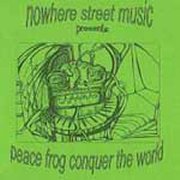 |
 |
Peace Frog Conquer the World (2005, 66.19) **½/T |
||
| Sky Sunlight Saxon: An Introduction Cactus Cooper: Last Step on the Moon Mandra Gora Lightshow Society: Memories Quarkspace: Underspace Desperate Friends: Puzzle |
Fantasyy Factoryy: Escape Thee Hands of Tyme: I Looked at You In the Labyrinth: The Black Plague Yesterday's Thoughts: The Wind Blows Your Hair Cactus Cooper: No Measure |
Psychedelic Avengers: The Curse of the Universe Into the Abyss: Alexandria Cosmic Gardeners: Round Patricia Around John Frankovic: Go to Sleep Teddy Boys From the Crypt: Mini Dress |
||
Current availability:
Chamberlin used:
Athens (Greece)'s Nowhere Street Music have been in operation since the mid-'90s, 2005's Peace Frog Conquer the World being a various artists compilation of psychedelic bands, mostly German, with a handful of Americans and a couple of homegrown acts thrown in. To be brutally honest, the quality of the material isn't that high, although In the Labyrinth's The Black Plague, Into the Abyss' Alexandria and John Frankovic's Go To Sleep stand out.
In the Labyrinth provide the album's lone Mellotron action, Peter Lindahl slapping string, flute and cello parts all over The Black Plague in pleasing fashion. Unfortunately, despite an In the Labyrinth compilation, One Trail to Heaven, that mops up a couple of compilation appearances, their excellent contribution to this decidedly average effort is yet to be made available on one of their own albums.
See: In the Labyrinth
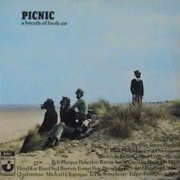 |
Picnic: A Breath of Fresh Air (1970, 77.04) ***/½ |
||
| Deep Purple: Into the Fire Barclay James Harvest: Mother Dear Pink Floyd: Embryo Battered Ornaments: Twisted Track Shirley & Dolly Collins: Glenlogie Pretty Things: The Good Mr Square Roy Harper: Song of the Ages |
Bakerloo: This Worried Feeling Kevin Ayers: Eleanor's Cake Which Ate Her Greatest Show on Earth: Again & Again Third Ear Band: Water Syd Barrett: Terrapin Forest: A Glade Somewhere Pete Brown: Golden Country Kingdom |
Panama Ltd: Round & Round Quatermass: Black Sheep of the Family Michael Chapman: Postcards of Scarborough Tea & Symphony: Maybe My Mind Edgar Broughton Band: Old Gopher |
|
Current availability:
Mellotrons used:
Harvest's early label sampler, 1970's Picnic: A Breath of Fresh Air, is a classic example of the genre, a budget-priced double giving the listener the probably already familiar (Deep Purple, Barclay James Harvest) with the probably not (Bakerloo, Panama Ltd.) and at least one 'otherwise unavailable' track (they learnt quickly, these labels). I'll admit to not be fully conversant with every band on the compilation, which sounds like most similar efforts (Atlantic's The New Age of Atlantic, also the recipient of a major band rarity in the shape of Zeppelin's Hey Hey What Can I Do, Island's punning El Pea) in being a most mixed bag, both of styles and qualities. Ignoring the familiar (Deep Purple's Into The Fire, BJH's Mother Dear, to an extent, Syd Barrett's Terrapin), stronger tracks here include Shirley & Dolly Collins' Glenlogie, the drumless folk-rock of Forest's A Glade Somewhere and Quatermass' rocking Black Sheep Of The Family, considered good enough by Ritchie Blackmore to cover on the first Rainbow album, five years hence.
There are two Mellotron tracks on the set, The Pretty Things' The Good Mr Square being available on 1970's Parachute, leaving the reason this is here at all: Pink Floyd's Embryo. The tale behind the track goes something like this: a live favourite at the time, for some odd reason, it never found its way onto any studio album, although the band had recorded (but not finished) most of a version of the track, maybe for inclusion on Atom Heart Mother. It's possible that, having got it onto tape, they realised it was a bit of a throwback to their psychedelic past (which it was) and out of step with their progressive future. Whatever actually happened, Harvest got hold of the allegedly unfinished master and stuck it onto Picnic, probably less as a representative sample of the band's work (they were one of the label's best known outfits, of course) and more as a teaser, drawing in Floyd fans who might not otherwise have bothered. The band were apparently most unhappy at its inclusion, although unable to insist upon its removal.
Upon listening to it again, I'm trying to work out what they might have added to the dreamy piece, actually more in line with the previous year's More soundtrack than the band's then-current work. It sounds finished, at least to my ears, making it one of several rarities from the era (single Point Me At The Sky is particularly hard to find); bizarre, for such a major band. Anyway, it turned up years later on 1983 Floyd compilation Works (again, unsanctioned by the band), which also found its way onto CD, making the track more available that some of their other obscurities. Oh yes - the Mellotron: in one of their black-and-gold MkII's last outings, it provides the flute line running through the song.
So; not on CD and most unlikely ever to be reissued for various reasons, not least the labyrinthine contractural issues involved and the availability of most of its contents. Floyd fans can probably track down their contribution on Works more easily, making this, at best, a curio from the dawn of the progressive era, although it makes for an interesting listen for fans of the time, forty years on, sampling what one of the leading labels of the day considered worth hearing from its catalogue.
See: Pink Floyd
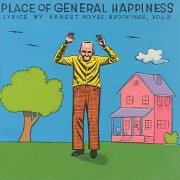 |
Place of General Happiness: Lyrics By Ernest Noyes Brookings, Vol. 2 (1991, 69.33) ***½/T |
||
| Brave Combo: Skin Michael Gregory: Boomtown Young Fresh Fellows: Yankee Magazine Fred Frith: Life of a Detective Lonesome Bob: My High School Education Incredible Casuals: Toast Men & Volts: Dinner |
Rubber Rodeo: Planning and Completing an Explorative Trip to Planet Mars Birdsongs of the Mesozoic & Willie "Loco" Alexander: Interference Distraction 7 or 8 Worm Hearts: Kiss XTC: Rocket Bim Skala Bim: Fifty Monique Experience: Bats |
Staff of Fort Apache: Hair Victor Banana: Why I Write Poetry Chunk: Shut Up No Man's Band: Monarchs Maestro Subgum & the Whole: Watermelon Splatter Trio: Cheese Annie Richmond Boston: Speed of Sound |
|
Current availability:
Mellotron used:
Ernest Noyes Brookings (1898-1987) only began writing poetry in 1979 (he apparently needed to be 'supplied with a theme'), but took to it with the mad enthusiasm of a child, writing four hundred-odd in the last eight years of his life, many of which were published in magazines, not to mention 1983's We Did Not Plummet Into Space anthology. Examples of his work? "Skin covers up animals and humans" (Skin), "No, not even one pertinent clause" (Life Of A Detective). Beyond literal, but very, very funny, albeit probably not deliberately. The poetic equivalent of outsider art, methinks.
Place of General Happiness: Lyrics By Ernest Noyes Brookings, Vol. 2 is quite deranged, in its own way, featuring a stack of better- and less well-known artists interpreting Brookings' work in their own inimitable styles. Most successful? Has to be a matter of opinion, but Andy Partridge does his usual thing on XTC's Rocket, while Birdsongs of the Mesozoic team up (rather surprisingly) with Willie "Loco" Alexander on the skronky Interference Distraction.
Fred Frith tackles Life Of A Detective with manic aplomb, adding pretty full-on Mellotron string, cello and flute parts to the track, while the Staff of Fort Apache's Hair has flutes from Sean Slade. Given the estimable Mr Brookings' age, it might be quite a good thing he never heard this album; I can't imagine what he'd make of, say, Birdsongs of the Mesozoic or XTC's contributions, although who knows? Maybe he could also have discovered a late-in-life passion for odd, skronky post-punk. Stranger things have happened.
See: Fred Frith
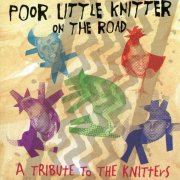 |
Poor Little Knitter on the Road: A Tribute to The Knitters (1999, 41.52) ***½/½ |
||
| Trailer Bride: Poor Little Critter on the Road Kelly Hogan & the Rock'a'Teens: Someone Like You The Sadies/Catherine Irwin: Walkin' Cane Whiskeytown: Silver Wings Ground Speed/Nora O'Connor: Poor Old Heartsick Me |
The Blacks: The New World Old 97's/John Doe: Cryin' But My Tears Are Far Away Anna Fermin & Friends: Love Shack Robbie Fulks: The Call of the Wreckin' Ball The Handsome Family: Trail of Time |
99 Tales: Baby Out of Jail Devil in a Woodpile: Rock Island Line The Knitters: Why Don't We Try Anymore |
|
Current availability:
Mellotron used:
The Knitters (named in possibly non-ironic homage to The Weavers) were cowpunk pioneers, the genre that eventually morphed into alt.country. Fittingly, their lineup comprised three members of West Coast punks X and two roots-rock guys, although their music tended towards the country end of things, albeit with a caustic edge. 1999's Poor Little Knitter on the Road is a track-by-track tribute to their then sole album (they released a follow-up twenty years later), 1985's Poor Little Critter on the Road, by artists directly influenced by them, not least Old 97's and the iconic Whiskeytown. Is it any good? I haven't heard the original, but this is a joyous affirmation of Americana, country without the schmaltz, western without the swing. Best track? Probably Robbie Fulks' superb The Call Of The Wreckin' Ball, largely due to its impeccable source material, plus top marks for the ripping Tele solo on Anna Fermin & Friends' Love Shack.
Ryan Adams plays Mellotron on his then-band Whiskeytown's take on Silver Wings, not that you'd really notice if you didn't know. Is it only me who thinks the band were overrated? Anyway, if you haven't heard the original album, you could do a lot worse than get to hear this one, although you're not going to bother for the Mellotron use.
See: X | Whiskeytown
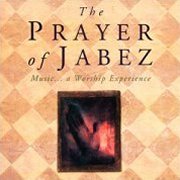 |
The Prayer of Jabez: Music... a Worship Experience (2001, 29.17) */½This is My PrayerThe Prayer of Jabez Be in Your Blessing Beyond the Borders Touch of Greatness Lead Me Away The Day is Dawning |
Current availability:
Mellotron used:
OK, here's one from Nick Hewitt.
His first paragraph is a general 'caveat' for his CCM reviews!
I have been asked by the good and wonderful Andy Thompson to review this album for two reasons. Firstly, he doesn't possess a copy of the album. Neither do I, but my wife (Sue) does. Secondly, he shares my dislike for Contemporary Christian Music (a.k.a. CCM), for reasons that Sue (who IS a Born-Again Christian) fully understands - that is, the most important element of CCM is the Christian message and, as a result, the actual music comes second and a poor second at that. Andy would consider CCM to be worse than Harris Chalkitis (see his review!) Therefore, as a committed non-Christian, how can I be 'qualified' to review CCM? The answer to that is simple - when I listen to music, I very rarely listen to the lyrics. I treat the human voice as a musical instrument, alongside guitars, drums, basses and, on those too-rare occasions, Mellotrons. Therefore the Christian message, in my case, goes in one ear and out the other. It has to be said that in a lot of cases, the exit orifice will vary. Anyway, as I am reviewing the music leaning towards the Mellotron, this should not present a problem - the Christian content, from my standpoint, becomes irrelevant. There was something that I read a few years ago, that is applicable to my attitude towards religion, which was credited to Sci-Fi writer Terry Pratchett. I don't know why he said it, nor the context it originated from, but he came up with the quote/axiom "Freedom of Religion includes Freedom from Religion". This short phrase neatly sums up my opinion of ALL religions, not just Christianity. Certain Ayatollahs in Middle East countries would do well to take that on board - like they read anything I write!
Anyway, to the matter in hand. The Prayer of Jabez is a CD put together by a collection of Christian friends, inspired by the book of the same name. It has to be said that it is a very large collection of friends as on the 7 tracks, there are a total of 11 lead singers, with 3 of the tracks having a support lead singer, as well as 15 instrumental musicians. The insert tells you who sings on what, but NOT who plays on what. Judging by the contents of my wife's collection, this is quite common within the CCM community. Unfortunately, while people are religiously (no pun intended) listed on the CD insert, their precise contribution is not, which makes Mellotron spotting a nightmare. The only information I can glean is that Mellotron is supplied by a Phil Madeira, whose name also crops up with alarming regularity on a whole host of other CDs within the wife's collection. Unfortunately, Jabez appears to be his only dalliance with the Mellotron. [Ed: only in Sue Hewitt's collection; he's otherwise a very prolific Mellotronist]. An interesting side-note is that one of the Executive Producers is one Greg Ham - the same Greg Ham from Men at Work (of Down Under fame).
The review copy used in this missive was a British issue, which came as part of a 3-CD set, entitled The Breakthrough Trilogy. For trainspotters out there, the other CDs, done by the same producers, but with a slightly different set of musicians are Secrets of the Vine and A Life God Rewards. All 3 CDs may be available as separate entities, depending on which part of the world you live in.
The entire CD can best be described as mid-paced soft rock, tending towards ballads. They do try to be a little different from 'normal', but it's too little to make THAT much of a difference. Let's just say that they're very trying! In Mellotronic terms (if such a word exists) there appears to be some choirs being used as a background in Beyond The Borders and some flutes fade in and out of the background of The Day Is Dawning, but in both cases, Mellotron use is minimal and probably wasted. If you're a committed Christian, you've probably already got this. If you haven't (or you aren't), don't bother, on the music and/or Mellotron front. Also, at less than 30 minutes playing time, you are being ripped off. Avoid... please!
| Nick Hewitt |
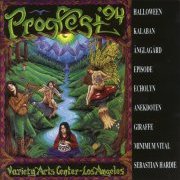 |
Progfest '94 (1995, 146.47) ****/TTTT |
||
| Halloween: Outsider Suburb What's in Kalaban: Mutants Over Miami Eyes of a Seer Hotash Slay Änglagård: Höstsejd Episode: Echoes |
Echolyn: The Cheese Stands Alone A Little Nonsense Here I am Anekdoten: Muscle Beach Benediction (Biceps at Play) Wheel Mars Giraffe: Fly on a Windshield/Broadway Melody of 1994 The Colony of Slippermen/A Visit to the Doktor The Musical Box |
Minimum Vital: Les Mondes de Miranda La Source L'Invitation Sebastian Hardie: Glories Shall Be Released Journey Through Our Dreams Everything is Real |
|
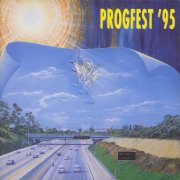 |
Progfest '95 (1996, 127.29) ****½/TTT |
||
| Arsnova: Morgan Jihad Danse Macabre Landberk: Kontiki Dream Dance Time |
Deus ex Machina: Exordium Res Publica II Ad Montem Si Tu Bene Valeas Ego Bene Valeo White Willow: Lord of Night Cryptomenysis |
Spock's Beard: The Light Solaris: Apocalypse Oz Hungarian Danse Solaris |
|
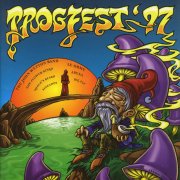 |
Progfest '97 (1997, 141.59) ****/TTT½ |
||
| The John Wetton Band: In the Dead of Night Rendezvous 6:02 Starless Le Orme: Madre Mia/Primo Acqua Il Vecchio Il Fiume, pt. 2 Felona & Serona (parts a,b,c,d) |
Arena: Medusa Sirens The Flower Kings: Retropolis Humanizzimo (parts a,b,c,d) Spock's Beard: Thoughts Go the Way You Go |
Bigelf: Mindbender Sell Out Neuropsychopathic Eye Sinkadus: Ättestupan |
|
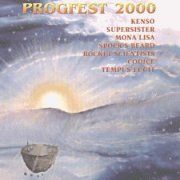 |
Progfest 2000 (2001, 129.24) ***½/T |
||
| Kenso: Sora Ni Hikaru Negal Kanaeru Kodomo Hyoto The Shadow Over Innsmouth Mediterranean & Aryan Supersister: Judy Goes on Holiday Mona Lisa: Captif de la Nuit |
Les Guerriers Tripot Les Sabots de Lena Spock's Beard: Gibberish Rocket Scientists: Dark Water/Earthbound Aqua Vitae In the Flesh?/Oblivion Days |
Codice: Bitácora de Sueños Dentro de la Máquina Espíritus en Movimiento I/Eva/Espíritus en Movimiento II/Salmo 150 Epílogo Tempus Fugit: Never Prologue Goblin's Trail |
|
Current availability:
Mellotrons used:
To my knowledge, Progfest existed between 1993 and 2000, missing the odd year here and there. Taking place in Los Angeles, it was arguably the biggest and most important progressive festival in the world, having hosted names such as Änglagård (twice), Le Orme, Anekdoten and Landberk, not to mention persuading several bands to reform for the occasion, not least Australia's Sebastian Hardie. I don't know if the first year was recorded, but since 1994 all the sets have been recorded onto multitrack, creating a priceless archive of progressive rock talent. Double CDs from three consecutive festivals have been released, opening the door for many similar efforts from other festivals, although the quality of artists is rarely matched (until the more recent NEARfests, anyway). Many of the sets excerpted above have now been released in their (near) entirety; Änglagård's set, released as Buried Alive is missing one track, but Solaris' 1995 set is available as a double CD in its own right. Sebastian Hardie, Spock's Beard and Sinkadus have all followed suit, so it's entirely possible that other albums will leak out in the future.
After the triumph of 1993's festival, with Änglagård well down the bill and a reformation of US lunatics Quill, the double CD/video of the '94 event, Progfest '94, let the rest of the world know what they were missing. Of course, you can only get a small taste of each band this way, but it's good to know that their sets were recorded in their entirety. The first few years were overseen by the (now sadly late) Kevin Gilbert and he, I believe, provided various items of antique equipment for the bands' use, including a Hammond, a MiniMoog and two Mellotrons. By no means all bands availed themselves of the offer, but Änglagård, Anekdoten, Giraffe and Sebastian Hardie all took the opportunity to sound as good as possible on the night. As previously mentioned, both Änglagård and Sebastian Hardie's sets are available separately, but the brief snippet of Anekdoten's set makes it sound like they were on a real roll, particularly their version of Crimson's version of Holst's Mars (!) with Niklas Berg on Mellotron; any chance of a full release for this, chaps?
Giraffe were basically Kevin Gilbert and a bunch of mates (including future Spock's Beard drummer Nick d'Virgilio and David Kerzner on keys) playing a truncated version of Genesis' Lamb, with The Musical Box as an encore, using mostly authentic equipment, including (of course) the full-on Mellotron of the cheekily-retitled Fly On A Windshield/Broadway Melody Of 1994. Sebastian Hardie's three tracks are basically an edited version of their fantastic Four Moments opus, played in full on the night. Loads of Mellotron throughout, from Toivo Pilt; anyone who thinks Australians can't play full-on symphonic prog should give this lot a blast, despite the slightly under-rehearsed nature of the performance.
'95's festival CD set, Progfest '95, features the only decent artwork of these three releases; I'm not sure if it was specially commissioned, but the stunning 'peeling away reality' theme beats 'bad fantasy art' hands down. Japan's all-female trio Arsnova are dedicated synth merchants (including a nice Prophet 600), but Sweden's excellent Landberk, traditionalists to a man, used nowt but Hammond and Mellotron on the keyboard front (from Simon Nordberg) to great effect. Given that the band are now no more, a full release of their set seems sadly unlikely. What about it though, Musea? Deus ex Machina, singing in Latin, aren't known for their Mellotron use, but Luigi Ricciardiello obviously decided that if it was there, he might as well indulge. Not very much, mind you; a few seconds of strings (distinctly different from the violin and cello also on stage) in Exordium and that would appear to be it, although they may have used it elsewhere in their set, of course.
On disc two, White Willow's Lord Of Night, sounding heavier than its studio counterpart, features some full-on Mellotron choirs and flute from Jan Tariq Rahman, with a string part on Cryptomenysis, missing from the original. Spock's Beard's The Light is available on their The Official Live Bootleg/The Beard is Out There CD (their debut gig, unbelievably), but just for the record, it's stuffed full of new keys man Ryo Okumoto's Mellotron (he used two on the night), although Polish supremos Solaris are, again, synth-only men. Although the festival lacked the highlights of the previous year's bill, it's actually more consistent; probably the most consistent ever, to be honest, with not a whiff of the also-ran about any band present.
There was no '96 festival, but on the CD set for '97, Progfest '97 (is this getting slightly predictable?), it's extremely difficult to tell who might or might not be using real Mellotron. There was definitely at least one there, as Spock's Beard (still only their third gig!) and Sinkadus used it (you can see one in the 'Beard's booklet pic), but although every other act used them (or samples) in the studio at one time or another, it's hard to say who availed themselves of the real thing on the night. John Wetton had IQ's Martin Orford on keys, making two ex-Mellotron users in one band and the slightly truncated Starless does actually sound pretty authentic (Martin has subsequently confirmed to me that he used the house Mellotron); it's notable that the three Wetton tracks on the disc consist of two UK songs and one Crimson. So that'll be no Asia, then. Thankfully. I've no idea what made up the bulk of Le Orme's set, but three of the four tracks here are from their (then) new album, Il Fiume, with the remainder being excerpts from their masterpiece, the English-language version of Felona & Serona. Michele Bon (one of two keyboard players) is credited with 'Melotron', but I'll be buggered if I can hear it anywhere. Maybe he used it elsewhere in their set.
The not-very-good Arena manage to be their usual pompous, overblown selves (with terrible drumming) and seemingly without the festival Mellotron, although Clive Nolan uses one in the studio. My problem with The Flower Kings' set is that, as with their studio, albums, it's difficult to know whether or not the Mellotron is real or sampled (n.b. all sampled). I'm not sure why you'd use samples if a real one's being provided, but there you go. Of course, they use Mellotron sounds: Retropolis opens with a cool string part, with another 'almost wobbly enough to sound authentic' part towards the end of the song, with some more on the Humanizzimo excerpts, from Stolt's solo The Flower King opus. Video evidence, however, shows Tomas Bodin playing the parts on, of all things, a Korg M1, presumably MIDI'd to a module, so bang goes that theory. Spock's Beard slap it all over their two tracks in most pleasing fashion, of course, as do Sinkadus with their one, leaving Bigelf's Damon Fox to struggle with too many keyboards to play all his studio parts, as he concentrates on Hammond. As a result, I can't hear any Mellotron on Sell Out or Neuropsychopathic Eye, although it's clearly audible on the studio versions, on Money Machine, from three years hence.
The festival became more intermittent after this, its glory days seemingly behind it, but Musea released what would appear to be one last festival compilation, Progfest 2000. The lineup's the least impressive yet, sad to say, with a couple of the more major acts not making the album (Banco and Transatlantic, who would only have used samples anyway), although both Kenso and Mona Lisa manage to be quite excellent, although the less said about much of Tempus Fugit's contribution the better... Actually, that's not really fair; they veer between appalling neo-prog rubbish and almost-transcendental beauty from track to track. Consistency please, gentlemen. The only definite Mellotron use is from the ubiquitous Spock's Beard (again), with some nice flutes and strings on Gibberish, while the Rocket Scientists' Aqua Vitae and Oblivion Days have what sounds 'quite like' a Mellotron, though I have a nasty feeling it isn't, especially as there's two sounds going at once at one point.
The festival seems to have been supplanted by the East Coast NEARfest these days, although, as yet, there have been no compilations made available, although I know that Mellotrons have turned up at least once. In 2003, both Änglagård and Camel, surprisingly, used them, but don't hold your breath for their sets to make it onto CD.
So; do you buy these albums? Well, they all contain some great performances unavailable elsewhere, although complete sets from three of the four have been released. They're all pretty good tasters of the complete festivals; if only more of those complete sets were made available... Music aside (!), I'd say there's enough otherwise-unavailable Mellotron stuff on the first three sets to make them worth the effort on those grounds alone, particularly Anekdoten and Landberk's tracks, although there's less utterly essential stuff on the '97 and 2000 sets. Buy anyway.
See: Änglagård | Anekdoten | Sebastian Hardie | Landberk | White Willow | Spock's Beard | John Wetton | Martin Orford | Bigelf | Sinkadus | Rocket Scientists | Erik Norlander
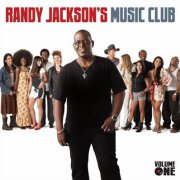 |
Randy Jackson's Music Club, Volume 1 (2008, 47.59) *½/T |
|
| Paula Abdul: Dance Like There's No Tomorrow Joss Stone: Just Walk on By Keke Wyatt, Trisha Covington & Kiley Dean: What am I So Afraid of? Crunk Squad featuring Ghostface Killah: Like A Kelli Love: Who's Gonna Love You Now Sam Moore, Keb' Mo' & Angie Stone: Wang Dang Doodle |
Jason Mraz, Van Hunt & Jon McLaughlin: Something to Believe in John Rich & Anthony Hamilton: Home Barbi Esco: My R&B Katharine McPhee & Elliott Yamin: Real Love Richie Sambora, Travis Tritt & Lucy Woodward: Willing to Try Bebe Winans, Kim Burrell, Rance Allen, Mariah Carey & Hezekiah Walker: I Understand |
|
Current availability:
Chamberlin used:
Randy Jackson (nothing to do with the infamous 'first family of pop', or however they're known) is a session guy who's gained a considerably higher pubic profile than before as a judge on American Idol (a.k.a. Pop Idol everywhere else). Randy Jackson's Music Club, Vol. 1 isn't precisely a solo album, as it seems Jackson doesn't actually play on the thing, but he's collated and produced the project, pulling together loads of big names (including dragging at least one, Paula Abdul, out of retirement), shunting them together in odd combinations and releasing the end result with his name and picture writ large on its sleeve.
Surely you're not going to ask me if this is any good? After seeing the above rating? Frankly, even if I liked the musical forms involved, it's a mess; as one online reviewer mentioned, how many record buyers actually want to hear a bunch of such disparate styles on one album, anyway? The best thing here is Sam Moore, Keb' Mo' and Angie Stone's actually pretty good take on Howlin' Wolf's Wang Dang Doodle, thankfully free of any crummy modern production nonsense, but that's it for anything listenable, sadly. Particular low-points? The wildly overrated Joss Stone's almost unrecognisable take on Bacharach's Walk On By, Crunk Squad featuring Ghostface Killah's Like A (Jesus shit - all the production tricks you hate most in one neat package) and Barbi Esco's quite hideous My R&B, which seems to namecheck various non-talents, for the untold millions who actually think they have something to offer. Richie bloody Sambora's track's pretty shite, too.
Patrick Warren really does seem to've cleaned up in the 'top Chamberlin session guy' stakes, trouncing all-comers to the crown by playing the thing on over a hundred albums (to date). What we get here (as far as I can ascertain) is a string part on Kelli Love's Who's Gonna Love You Now, Jason Mraz, Van Hunt and Jon McLaughlin (not that one, fool)'s horrible Something To Believe In and Barbi Esco's My R&B, although I think the strings on Katharine McPhee & Elliott Yamin's Real Love are real. Any or all of the above could actually be something else, though; as so often, it's exceedingly difficult to tell a Chamberlin from a string section or a string sample, making you wonder why so many producers apparently insist on it. Not that I'm complaining, mind, I'm just not sure I can see the point.
So; a messy waste of time with plenty of potential Chamby stuff, though pretty much none on which you can actually rely. Pointless. How long before Volume 2, then?
See: Van Hunt | Jason Mraz